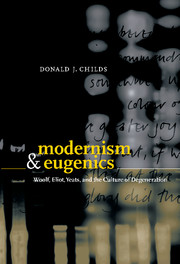Book contents
- Frontmatter
- Contents
- Introduction
- Chapter 1 Virginia Woolf's hereditary taint
- Chapter 2 Boers, whores, and Mongols in Mrs. Dalloway
- Chapter 3 Body and biology in A Room of One's Own
- Chapter 4 Eliot on biology and birthrates
- Chapter 5 To breed or not to breed: the Eliots' question
- Chapter 6 Fatal fertility in The Waste Land
- Chapter 7 The late eugenics of W.B. Yeats
- Chapter 8 Yeats and stirpiculture
- Chapter 9 Yeats and The Sexual Question
- Notes
- Index
Chapter 1 - Virginia Woolf's hereditary taint
Published online by Cambridge University Press: 22 September 2009
- Frontmatter
- Contents
- Introduction
- Chapter 1 Virginia Woolf's hereditary taint
- Chapter 2 Boers, whores, and Mongols in Mrs. Dalloway
- Chapter 3 Body and biology in A Room of One's Own
- Chapter 4 Eliot on biology and birthrates
- Chapter 5 To breed or not to breed: the Eliots' question
- Chapter 6 Fatal fertility in The Waste Land
- Chapter 7 The late eugenics of W.B. Yeats
- Chapter 8 Yeats and stirpiculture
- Chapter 9 Yeats and The Sexual Question
- Notes
- Index
Summary
Virginia Woolf's eugenical self has gone largely unremarked – perhaps not surprisingly. On the one hand, as Woolf's latest biographer Lee observes: “Virginia Woolf doesn't have a life, she has lives.” Similarly, as Woolf herself notes of Orlando, “she had a great variety of selves to call upon, far more than we have been able to find room for, since a biography is considered complete if it merely accounts for six or seven selves, whereas a person may have as many thousand.” So the fact that one of Woolf's selves has gone unheard and one of her lives untold is not surprising in itself. On the other hand, this silence may be a function of the fact that such a self and such a life do not accord with today's received myths. As Lee notes, “from the 1960s onwards, rival myths took shape out of the libertarian, radical and feminist movements of the time, constructing Virginia Woolf as a bold, revolutionary pioneer, a Marxist and lesbian heroine, a subversive cultural analyst and a historian of women's hidden lives.” Some of those who subscribe to such myths may regard the thesis that Woolf was a eugenist as an attack upon her, and since, as Eliot observes, “[t]here is a large class of persons, including some who appear in print as critics, who regard any censure upon a ‘great’ [writer] as a breach of the peace, as an act of wanton iconoclasm, or even hoodlumism,” I must hasten to add that this essay is not part of what Lee calls the “hostile Leavisite attack on Woolf … as a pernicious and typical representative of Bloomsbury elitism, prejudice and complacency.” I simply agree with Lee: “all the information and all the interpretations should be written, or re-written, as accurately as possible.” Therefore, the eugenical self needs a voice; the eugenical life, a telling.
- Type
- Chapter
- Information
- Modernism and EugenicsWoolf, Eliot, Yeats, and the Culture of Degeneration, pp. 22 - 37Publisher: Cambridge University PressPrint publication year: 2001



